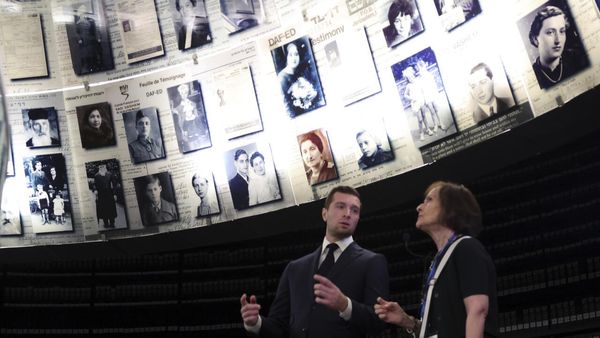A man who was given five years to live after being diagnosed with an incurable brain tumour has outlived his prognosis by two years and is now planning to run the London Marathon for charity. Matthew Stride was just 26 when he was diagnosed with an incurable grade 3 anaplastic astrocytoma in 2015 – a rare malignant brain tumour.
The client success specialist, who is now 33, said the news was “devastating”. Matthew said: “To get a prognosis of five to six years was crushing.
“You have these plans for your future and you’re thinking about what you want in life, and you never really think you’re going to be given five or six years to live.” But, having outlived “the dreaded prognosis” by two years, Matthew has found love with his now wife, Amy, and hopes to have children one day.
He is also planning to take on the TCS London Marathon in April to raise money for Brain Tumour Research. Matthew, from Birmingham, explained that he had a very fortunate upbringing, as his dad, Steve Stride, was secretary and director for Aston Villa Football Club.
This allowed him to travel, watch football matches, and meet some famous faces along the way. Matthew has always kept fit and healthy, but it was during a five-a-side football match with colleagues in 2014 that he noticed “something wasn’t right”.
He said: “I just couldn’t move, and everyone was asking me, ‘what are you doing?’ I wasn’t chasing the ball; I just stood there and was completely frozen. I was aware of what was going on around me, but I just couldn’t react to anything.”
This prompted Matthew to see his GP in January 2015. He underwent various tests and scans over the following months, but he said his symptoms were dismissed and he was told he may have anxiety or epilepsy.
It was not until a family friend, who is a doctor, suggested that Matthew get an MRI in November 2015 and he received the “devastating” news that he had a lesion on his brain. It was later discovered this lesion was in fact an incurable brain tumour, the size of a tennis ball.
He said: “My whole world was turned upside down. I was assigned to an oncologist at the Queen Elizabeth Hospital, and he had to talk me through the next steps and, obviously, the dreaded prognosis.
“(Being given five to six years to live) was the hardest thing to hear. My mum and dad were both in the room at the same time and my dad broke down. It was one of the first times I’d seen him cry, which is obviously never easy to see anyway, but when it involves you, it’s even worse. That was a tough day.”
Matthew underwent a seven-hour craniotomy procedure to remove as much of the tumour as possible at the Queen Elizabeth Hospital, in Birmingham, on 6 January 2016. He explained that he was awake for part of the operation, to limit the risk of damage to the healthy areas of his brain, and he has been left with a scar which measures approximately four inches by three inches.
Matthew recovered well after the operation, but he then faced the prospect of months of gruelling treatment, where he was likely to suffer from sickness, hair loss, and debilitating fatigue. He was also unable to drive due to his diagnosis, and he struggled with this loss of independence.
Matthew relied on public transport to travel to and from hospital for his treatment, and he underwent radiotherapy, Monday to Friday, for six weeks. He took chemotherapy tablets at the same time, which is when he noticed his hair falling out and the weight gain – he said the side effects were “pretty rough”.
Matthew was also told his treatment may cause infertility, which was another devastating blow, as he hoped to get married and have a family of his own one day.

He said: “The lowest point was probably the day I got the prognosis. But there was a week or two where I was quite down; you’re always thinking about (the future) and it’s not something you can just easily forget or erase from your memory. It was very, very difficult.”
Matthew’s treatment finished at the end of March 2016, and he had a break before a six-cycle course of another chemotherapy drug aimed at preventing the tumour from growing back. He explained that maintaining a positive mindset was “half the battle”, but with the support from his family, he was able to overcome the challenges he faced.
Matthew’s recovery went well and, two years on, in April 2018, he was back behind the wheel again. He met his now wife, Amy, 30, a finance director, in 2019 and he has since been informed by doctors that his treatment did not cause infertility, so the couple are hoping to have children one day.
Matthew was having scans every three months, then every four months to check on the tumour, and in March 2022 it was decided he could have the scans every six months because everything was stable. His last appointment in September revealed the tumour is not currently visible, which he said was “incredible”, and he is now training to run the London Marathon in April to raise money for Brain Tumour Research.
He is hoping to raise £3,500 and to beat his previous time of four hours and 33 seconds, as he ran the same marathon back in 2017. To find out more, visit Matthew’s fundraising page.







